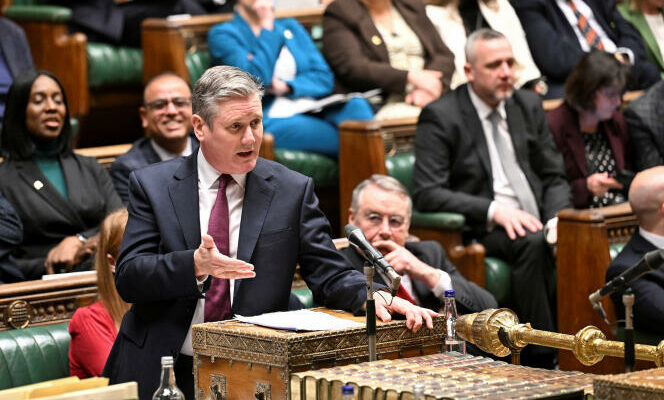The announcement was feared but it still distressed the left of Labor and environmental defenders: Keir Starmer, the leader of the British Labor Party confirmed, Thursday February 8, that he was abandoning the proposal to invest 28 billion pounds sterling (32.8 billion euros) per year of public money in the “green” economy (energy transition, housing insulation, etc.) if his party wins the next general elections scheduled for now at the end of the year.
The ambitious proposal was formulated in autumn 2021 and was the most salient measure of Labour’s programme, intended to meet the challenges posed by climate change, promote economic growth and replicate, on a UK scale. United, the American Inflation Reduction Act or the European Green Deal. But in recent months, tensions have been rising within Labor. Rachel Reeves, Chancellor of the Exchequer in Mr. Starmer’s shadow cabinet, pointed out the cost of the measure, considered too high as the United Kingdom’s public finances have deteriorated with the pandemic and the rise in rates.
Mme Reeves has pledged to maintain strict budgetary discipline if Labor wins, saying one of the party’s main obstacles to power is its reputation for lack of financial discipline. With this in mind, investing £28 billion a year in the “green” economy would not have delivered on the promise of reducing the country’s public debt. Labor had made a first setback, during 2023, by no longer committing to 28 billion in spending in its first year in power. With this definitive renunciation, Mme Reeves had the last laugh. “It’s the Tories’ fault [conservateurs]which caused enormous damage to the economy”, accused Keir Starmer on Thursday.
Calculated risk
Mr Starmer is taking a calculated risk: he hopes to lose less from giving up his “green” ambitions than from his promises of budgetary discipline. But his about-face fuels criticism of his supposed lack of conviction. Since taking over the reins of the party at the start of 2020, this former minister responsible for Brexit in Jeremy Corbyn’s shadow cabinet has managed to marginalize the left of the party and turn the tide with the Conservatives in the polls. These currently give Labor between 15 and 20 points ahead of the Tories.
But an image of excessive caution sticks to the skin of the MP for Holborn and St Pancras (in central London), who gives the impression of backing down as soon as one of his proposals is poorly received by public opinion or overly criticized by the conservatives. He thus renounced the abolition of university tuition fees, the revision of the social assistance system imposed by the Tories or the reintroduction of the cap on bankers’ bonuses. This renunciation also makes the distinction between Labor and Conservatives even more tenuous. Mr. Starmer is in fact campaigning on values typical of the right: patriotism, law and order, limitation of immigration, etc.
You have 20% of this article left to read. The rest is reserved for subscribers.
